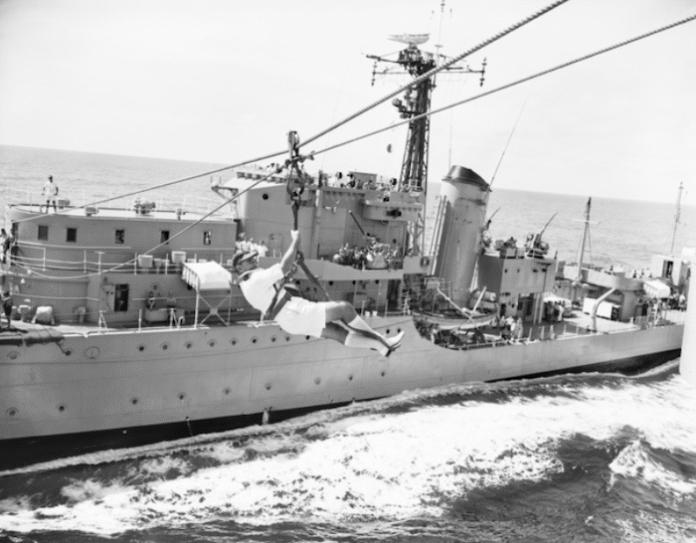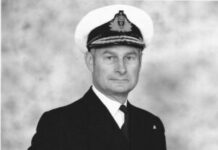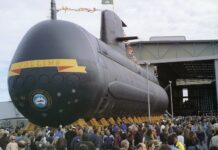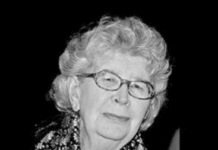
Within the pages of the Journal of the Australian Naval Institute are occasional forays into spiritual matters. One such article, “Chaplains and the Morality of Military Service” was written for the February 1987 edition by one of the Navy’s most notable and highly regarded chaplains, Bishop Geoffrey Mayne.
Chaplains and the Morality of Military Service
From time to time various concerned people query the role of Chaplains in the Defence Force and the support of the Catholic Church for their role. On the 21 July 1986 Pope John Paul II issued an Apostolic Constitution on the spiritual care of Defence Force personnel, and their families, around the world. The outstanding feature of this decree is to establish a Church for the Forces, equivalent to a Diocese.
The reasons for this are best expressed by the Pope himself:
- The Church has always desired to provide with praiseworthy concern, and in a manner suited to the various needs, for the spiritual care of Military people.
- They constitute, as a matter of fact, a particular social body, and because of the special conditions of their way of life, whether they belong permanently to the Armed Forces by virtue of voluntary enrolment, or are called up temporarily by law, they have need of a concrete and specific form of pastoral assistance.
Now, however, it must be said that the time has come to revise past structures and norms so that they may have greater impetus and efficacy. Leading to this above all is the Second Vatican Council, which opened the way to bringing about most suitable particular pastoral initiatives, and gave close attention to the role of the Church in the world today, especially in all that regards the promotion of peace throughout the whole world. In this context those who give Military service must be considered “ministers of the security and freedom of peoples” and indeed “if they carry out their duties properly, they also truly contribute to stabilising peace”.
This new step forward is also made advisable by the major changes which have come about, not alone as regards the Military profession and way of life, but also in the popular understanding in society today of the nature and duties of the Armed Forces in relation to the reality of human living.
Earlier, in a homily at a Military Pilgrimage in Rome in 1984, the Pope said: The morality of your profession, dear members of the Military, is linked to the idea of service for peace, in the individual National communities, and even more in the universal context. The logic of service, that is, the commitment to others, is fundamental to the Christian view of life. To go back to this source means to discover the profound justification for your situation, which includes readiness, sacrifice, a spirit of solidarity beyond even legitimate personal and family interests.’
To look at history is to find that Chaplains are almost as old as Christianity itself – not perhaps in the organised form we know them today, but their necessity was realised from early times, e.g., Crusades, early explorers. In our society when young men and women join the Services, they do not lose their rights as citizens. These rights include the freedom to worship God in the manner one chooses. The facility to do this is recognised and provided, as far as possible, by the Services. The Catholic Church, together with other Churches, provides Service Chaplains to help personnel fulfil their religious duties, to witness to their Christian faith, and to develop the moral and ethical principles necessary to carry out their duties properly. The Church commends the Service person’s special vocation to preserve the freedom and integrity of his own country and of his fellow citizens as one of the highest forms of citizenship. This vocation is not always popular in time of peace. Maybe it was well expressed by an old English veteran in the 18th century:
God and the soldier we adore
In times of danger, not before:
The danger passed, and all things righted,
God is forgotten and the soldier slighted.
The foundation of all our duties towards God, our neighbour and ourselves lies in the fact that we are God’s creatures and are given stewardship over our lives. Human beings do not have absolute mastery over life – life belongs to God, the Author of life. Catholic morality obliges us positively to be grateful for the gift of life – to respect the right of our fellow-man and woman to live in peace and happiness Many complex problems arise in human relationships and Catholic morality recognises examples where there can be justifiable homicide, e.g., to preserve one’s own life (self-defence) or to preserve the lives of others against unjust aggression. A person can choose to use or not to use this right.
The right of the serviceman or woman to go to war is based on the principle of self-defence, on the presumption that the war is against unjust aggression. They are entitled to learn the means and methods of self-defence to enable them to effectively defend their country if all forms of negotiation and diplomacy fail. To protect the rights of other nationals against unjust aggression requires that there be a just and proportionate cause.
We all want to live in peace. Chaplains and Service personnel are no exception to this wish. But I don’t think we help the cause of true peace by denying the possibility that we may have a duty to defend it. I believe that peace at any price is a false peace, because it involves a compromise of moral principles, a willingness to go along with evil – and for the Christian, with evil there can be no compromise, no treaty, no peace – no matter what the cost to ourselves personally. In the letter to the Hebrews, we are told, “In your fight against sin, you have not resisted to the point of shedding blood.” This implies for Christians the need for willingness to shed our blood in the struggle against evil. That certainly isn’t peace – it’s all-out war.
The major hope for peace lies with each one of us as individuals – to strive to eliminate from our world and society greed, lust, self-interest, disregard for the basic rights of men and women – the root causes of war. Those who want, and are willing to fight and work for peace and true freedom and justice, are fighting against superhuman forces. We must discover the moral forces necessary to influence the hearts and wills of all men and women to accept, and try to live the basic tenet everyone, without exception, is my brother and sister.
This again, in my opinion, is a very important reason for the presence of Chaplains in the Services. As long as the majority of people in the Defence Force are motivated by Christian principles, there is a greater safeguard for peace in our time. I shudder to think of the possibility of people who have no moral principles handling the modern destructive weapons. The presence of Chaplains helps to minimise that possibility.
So I believe there is a necessity for Christians to assume a leadership role in the work for peace. However, in so doing, we must strive to keep in touch with reality. In everything concerning human relationships, we will be faced always with those who, disregarding the basic rights of man, are power-hungry, lustful, cruel and greedy, and who will propagate philosophies which pander to their distorted outlook. These philosophies will be scattered through with some truths and half-truths which will beguile and deceive the undiscerning. The anti-human travesty of atheistic Communism and the greedy exploitation and selfishness of the excesses of Capitalism are obvious examples.
The effects of Godlessness and sin in our world are only too evident. This is why the Bishops of the Catholic Church, in reflecting on the griefs and anxieties of today’s world, among so many things, dealt with our yearnings for peace and the horrifying reality of war. In the midst of these deliberations, they stated that governments cannot be denied the right to legitimate defence and have the duty to protect the welfare of the people entrusted to their care.
As that great apostle of true peace. Pope Paul VI said, “Military disarmament, if it is not to constitute an unforgivable error of impossible optimism, of blind naivete, of a tempting opportunity tor others’ oppression, has to be common and general. Disarmament is either for everyone, or it is a crime of neglecting to defend oneself.” In these words, he was reinforcing the statements of the Vatican Council.
Pope John Paul II, in 1982, warned against ideologies that hold out the prospect of a totally and permanently peaceful human society as easily attainable – such deceptive hopes lead straight to the false peace of totalitarian regimes.
People may hold different ideas of how the common good is to be defended effectively Individuals may choose to forego their fundamental right of defence, but they may not renounce their obligation to others. Governments must defend against armed aggression.
A genuine contribution to the establishment of peace is being made today by those men and women of the Australian Defence Force who are pledged to the service of their country and their fellow-citizens. The Church recognises this fact by appointing a Bishop and Chaplains for the spiritual, religious and pastoral care of these men and women and their families who are deserving of special consideration.
The Chaplains and I look upon it as an immense and overwhelming privilege to be able to love and serve those who are prepared to die, if necessary, so that we may continue to live in freedom and peace, however fragile it may be. We love and respect them because theirs is not just the carrying out of a job but the fulfilment of a very important vocation for which there is need in our time. Patriotism, loyalty and mutual concern are integral parts of our Christian tradition and are in true accord with a desire for genuine peace and justice. Should they disappear from our land then we may well have surrendered our capacity to survive.
About the Author
Bishop Geoffrey Francis Mayne AM DD was born in 1928 and educated at St Aldan’s in Maroubra, Waverley College and Sydney University. He initially worked as a pharmacist, but after graduating from St Patrick’s Seminary in Manly in 1956, he was ordained a Roman Catholic priest. In 1965 the Father Mayne joined the RAN and served until 1983. During that time served ashore and afloat and saw active service overseas in the fast troop transport HMAS Sydney. Geoff Mayne was a keen sportsman, founding, among other things, the Mons (Monsignor’s) Cup for Rugby Union in the Navy. He was Fleet Chaplain from 1972-74 and Naval Support Command Chaplain from 1972-82.He was promoted to Principal Chaplain in 1977 (CDRE equivalent) and then to Monsignor in 1979.
On retirement from full time service he was appointed Parish Priest to Mosman until 1985 when he was elected Catholic Military Vicar and ordained Bishop at St Christopher’s Cathedral, Manuka in 1985. The diocese of Catholic Military Ordinanate was established in July 1986 and Bishop Mayne was appointed as the first Catholic Bishop to the Australian Defence Force. He held this office until 2003 when he retired due to failing health.
Bishop Mayne died in September of that year. In his eulogy Rabbi Raymond Apple said Bishop Mayne, “With members of the ADF, and especially in the Navy, he had an Aussie relationship of bluntness, banter and fierce loyalty. With the chaplains who worked with and later under him, he had a brotherly relationship of concern, care and support. With his multi-faith colleagues in the Religious Advisory Committee, where for so long he was the doyen, he had a relationship of mutual respect and trust.” Archbishop Carroll said Bishop Mayne’s love of Christ and the Church “always shone through in his colourful and sometimes mischievous personality”.



